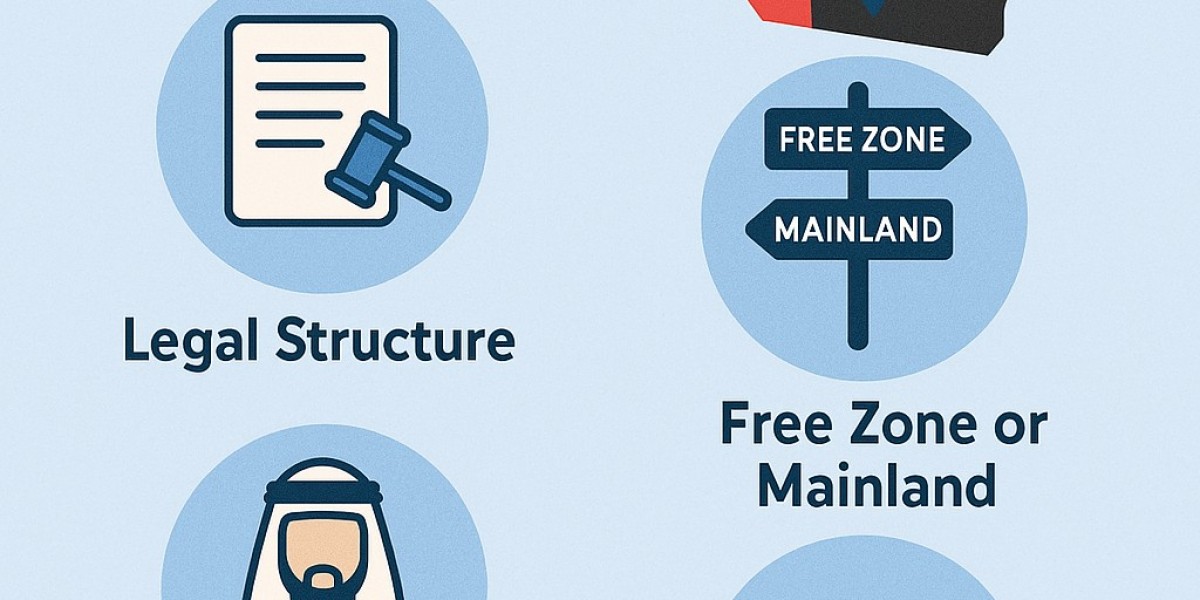What Should I Consider with a Business Setup in UAE? – Your 2025 Guide
Introduction – So, You’re Thinking of Starting a Business in UAE?
Alright, let’s be real — you wouldn’t be reading this if you weren’t at least considering jumping into the exciting, opportunity-packed world of business setup in UAE. And honestly? I can’t blame you. The UAE has been like that cool kid at the global economic party — everyone wants to do business with them. Whether you want to start a business in Dubai, launch a Dubai free zone company, or get that all-important UAE trade license, the possibilities are endless. But… (and there’s always a “but”), before you dive in headfirst, there’s a whole bunch of things you need to consider. Because while it’s an exciting ride, the UAE business landscape is a bit like a high-performance sports car — thrilling, but you’ve got to know how to drive it.
And here’s the thing — I’ve seen far too many entrepreneurs rush in, only to trip over a detail they didn’t think about. You know, things like Dubai mainland license rules, UAE investor visa eligibility, or even the small-but-important step of how to open a UAE business bank account without losing your mind in paperwork. That’s why I’ve put together this business setup in UAE guide 2025 — so you know what to expect, where the hidden speed bumps are, and how to make the journey smoother. So grab a coffee (or karak tea, we’re in the Gulf after all), and let’s break this down step-by-step. Oh, and expect a little bit of sarcasm along the way — because let’s face it, bureaucracy without humor is just… painful. :)
1. Understanding the Big Picture: Why UAE is the Place to Be
First things first — let’s talk about why so many people want to register a company in UAE. Yes, it’s sunny almost all year round (unless you count the occasional sandstorm that reminds you nature still runs the show), but the real magic is in the business environment. The UAE is like a buffet of opportunities: tax-friendly policies, global connectivity, modern infrastructure, and a melting pot of talent. Whether you’re an ambitious startup founder, a solo consultant eyeing the best free zone in UAE for freelancers, or a corporate giant plotting expansion, there’s a seat at the table.
But here’s the thing — you can’t just pick “Dubai” on a map, set up a desk, and call it a day. You’ve got to decide: are you going free zone or mainland? And yes, this is where the infamous Dubai free zone vs mainland comparison comes in. Each has its perks. Free zones offer full foreign ownership, easy setup processes, and often a ready-made community of businesses. On the other hand, a Dubai mainland license gives you the freedom to trade anywhere in the UAE without restrictions. So, if your business dreams include working with government clients or serving the wider UAE market, mainland might be your playground.
Oh, and a quick FYI — don’t get too carried away Googling “free zone company setup Dubai price list” just yet. In 2025, options are broader than ever, but you want to pick based on strategy, not just a tempting marketing flyer. The decision between free zone and mainland impacts everything — from UAE business setup requirements to how long to get a UAE trade license and even the type of UAE investor visa through business setup you can apply for.
So, before you even think about designing your office space or printing business cards, figure out your jurisdiction. This single choice can save you a ton of headaches down the line.
2. The Legal Backbone: Licenses, Visas, and Paperwork You Can’t Ignore
Alright, here’s the unglamorous truth — your dreams of company formation in UAE start with paperwork. And I’m not talking about “sign a form and you’re done” kind of paperwork. I mean the real deal: documents needed for UAE trade license, business activity approvals, and all the official stamps that make your business legal.
The first step? Choose your business activity. Sounds simple, but in the UAE, every business activity falls under specific license categories. Get it wrong, and you’ll be reapplying faster than you can say “Dubai company formation cost breakdown.” Whether you want a Dubai mainland license or you’re leaning toward a Dubai free zone company, your activity determines the type of license you need — commercial, professional, industrial, or tourism.
Then comes the visa side of things. If you’re an investor, you might be eligible for a UAE investor visa (and yes, it’s exactly what it sounds like — a residency visa tied to your investment). The UAE has been making this process smoother in recent years, especially for those setting up businesses, so you can get your visa sorted alongside your company registration.
And let’s not forget banking. You’ll need to open a business bank account in UAE, which sounds straightforward… until you realize each bank has its own rules, timelines, and paperwork demands. My tip? Start this process early. Banking here is thorough — they want to know who you are, what your business does, and that your operations are squeaky clean.
If you’re already panicking about timelines, relax. On average, UAE company formation timeline days can vary depending on the jurisdiction and your paperwork readiness. The key is preparation — have your documents in order, know your license type, and plan ahead for the visa and banking steps. It’s not rocket science, but it does require patience (and maybe a few extra coffees).
3. Choosing Your Location Wisely – Because Not All “Dubai” is the Same
Here’s the part no one tells you until it’s too late — “Dubai” is not one-size-fits-all. Even within Dubai, there’s a world of difference between the Dubai mainland license areas, free zones, and commercial districts. And then there’s Abu Dhabi, Sharjah, Ras Al Khaimah, Ajman… the list goes on. The UAE is like a giant business menu, and you need to pick your dish carefully.
If you’re setting up in a Dubai free zone company, you’re basically saying, “I want 100% foreign ownership, simpler paperwork, and a ready-made business community.” Many startups and SMEs go this route because it’s just more streamlined. You might even be hunting for the best free zone in UAE for startups 2025 — think areas with modern office setups, networking events, and flexible packages. On the flip side, if you want the freedom to trade directly in the UAE market without restriction, a Dubai mainland license is your ticket. It’s also the go-to choice if you plan on bidding for government contracts.
Ever heard of the Dubai mainland license cost vs free zone debates? People treat it like a sports rivalry. But the truth is, it’s not about who “wins” — it’s about what works for you. Free zones can sometimes feel like a close-knit club with perks, while mainland is the wide-open playing field. The catch? Mainland businesses have to play by a slightly different set of rules.
Now, location isn’t just about paperwork — it’s about vibe. Want to impress luxury clients? DIFC (Dubai International Financial Centre) screams prestige. Targeting tourists? Jumeirah or Dubai Marina might be your sweet spot. Going for e-commerce? You might not even need a flashy office, but you’ll still need a registered address for your company formation in UAE.
Pro tip: If you’re thinking of freelancing, don’t overlook the best free zone in UAE for freelancers options. They’re designed to keep your setup simple while giving you a legal framework to operate. And whatever you do, don’t just pick based on glossy brochures — visit, talk to people already working there, and see if the energy matches your business vision. You wouldn’t rent an apartment without seeing it first, right? Same logic applies here.
4. Financial Planning Without the Headache
Let’s talk about money — because whether we like it or not, your business setup UAE plan lives or dies by your numbers. And no, this isn’t just about the UAE business setup cost 2025 or finding the “cheapest” jurisdiction (spoiler: cheapest isn’t always best). It’s about financial strategy.
First up, you need to factor in your licensing, visas, and operational expenses. That means looking beyond the Dubai company formation cost breakdown and into the bigger picture. What will you spend on marketing, staffing, office rent, and tech infrastructure? You’d be surprised how many people obsess over the free zone company setup Dubai price list but forget they’ll need actual working capital to run the business afterward.
Here’s a little trick I tell clients: treat your first year like a test drive. Don’t blow the budget on a giant office or fancy branding before you even get your first client. Instead, start lean. If you can work from a smaller office in a free zone or share space, do it. Once revenue starts flowing, you can always scale up.
Another often-overlooked factor? Banking. You’ll need to open business bank account in UAE, and this should be in your financial plan from day one. Every bank has its own account maintenance rules and minimum balance requirements. Skipping this step or delaying it can cause cash flow nightmares later.
And yes, you’ll need to know your UAE business setup packages with visa options if you’re bringing in partners or employees. More visas = higher costs, but also more manpower to grow. Plan wisely, and don’t underestimate how much time and money the visa process can take.
IMO, this is where having a solid business setup in UAE guide 2025 pays off — because without one, you’re just guessing. And in business, guessing is expensive.
5. Navigating Cultural and Market Insights
Now here’s where things get interesting. Setting up shop in the UAE isn’t just about paperwork — it’s about people. If you’re going to thrive here, you need to understand the cultural and market dynamics. The UAE is a mix of tradition and innovation, where you can close a deal over Arabic coffee in the morning and attend a tech startup pitch in the afternoon.
Why does this matter for company formation UAE? Because your approach to clients, partners, and even hiring will be shaped by it. For example, relationships matter. Building trust can take time, but once you have it, it’s gold. That’s why networking events and business councils are worth your time. And yes, knowing a few Arabic greetings doesn’t hurt — it shows respect and willingness to integrate.
On the market side, think about your target audience. If you’re catering to the luxury market, you’ll find no shortage of high-net-worth clients in Dubai. If your focus is B2B, free zones like JAFZA or DMCC might put you right next to your ideal partners. If you’re a creative or consultant, you might be looking for the best free zone in UAE for freelancers where flexibility is king.
Cultural norms also affect timelines. You might wonder how long to get UAE trade license, but remember, public holidays like Ramadan or Eid can impact processing times. Knowing this upfront helps you set realistic expectations and avoid frustration.
Bottom line? The more you align your business style with the local rhythm, the smoother your journey will be. And hey, if you’re respectful, adaptive, and a little patient, you might just find that doing business here feels a lot like joining an extended family.
6. Building Your Team and Network
You’ve got the license, the bank account, and the strategy. Now comes the human side — your team. Whether you’re hiring full-time staff, freelancers, or a mix, the UAE offers a huge talent pool from all over the world. But here’s the catch: you need to match your hiring with your license type.
If you’re on a Dubai mainland license, you can hire from anywhere, but you’ll need to provide work visas. For free zone setups, you’re generally limited to hiring within that free zone unless you go through additional approvals. That’s why knowing your UAE business setup requirements is crucial before you start sending offer letters.
Networking is just as important as hiring. This isn’t a place where you can sit quietly and expect clients to find you. The UAE thrives on connections. Attend trade shows, join business councils, participate in industry events. And don’t underestimate the power of LinkedIn here — people actively connect and collaborate through it.
Want to really accelerate growth? Collaborate with other businesses in your space. If you’re setting up a marketing agency in a free zone, partner with a production house in the mainland. If you’re a consultant, team up with an events company to host workshops. The point is, the right network can open doors faster than any ad campaign.
And just a quick side note — your team isn’t only about employees. Your legal advisors, accountants, and even your banker are part of your business “family.” Choose wisely, because the right professional support can save you from costly mistakes (and a few sleepless nights).
7. Long-Term Growth Strategies in UAE
Setting up your business is just the first chapter — now you need to think long-term. The UAE is constantly evolving, with new regulations, incentives, and business trends emerging every year. That’s why the most successful entrepreneurs here don’t just react to changes — they anticipate them.
One way to do this is by keeping tabs on industry news and government updates. For example, if new UAE investor visa through business setup benefits are announced, be ready to leverage them. Or if certain industries get priority in free zones, position your business to take advantage.
Scaling also means expanding your reach. Maybe you start with a Dubai free zone company, but later open a mainland branch to access a wider market. Or perhaps you begin in one emirate and expand to others. Knowing your UAE company formation timeline days for expansions helps you plan without missing opportunities.
Digital transformation is another must. From e-commerce platforms to AI-driven customer service, staying ahead tech-wise can give you a serious edge. And yes, the UAE loves innovation — there’s a reason global tech summits keep coming here.
At the end of the day, your growth strategy should be as flexible as the UAE’s business environment. Stay adaptable, keep learning, and never stop networking. Because in this part of the world, opportunity knocks often — but you have to be ready to answer.
Conclusion
So, what should you consider with a business setup UAE? In short: everything from your license type and location to cultural understanding, financial planning, and long-term vision. Whether you choose mainland or free zone, whether you go big or start lean, the key is preparation. And yes, a dash of patience and a sense of humor won’t hurt either.
The UAE offers one of the most dynamic business landscapes in the world. If you play your cards right, follow the how to start a business in Dubai step by step approach, and stay connected, you’re not just starting a business — you’re building a legacy in one of the most exciting markets on the planet.
FAQs
1. What documents are needed for a UAE trade license?
Completed license application form
Passport copies of all shareholders
Passport-size photos
Business name reservation certificate
Initial approval from the relevant authority
Memorandum of Association (MOA) or Local Service Agent Agreement (for certain activities)
Lease agreement for your business premises
Any additional approvals for specific regulated activities
2. How long does it take to get a UAE trade license?
Free zones: Usually faster, sometimes within a few days if all documents are ready.
Mainland: Can take 1–3 weeks depending on approvals needed.
Factors affecting timelines: Public holidays, missing documents, additional approvals.
Tip: Having your paperwork 100% ready is the biggest time-saver.
3. What is the difference between Dubai mainland and free zone licenses?
Mainland: Trade anywhere in the UAE, work with government clients, hire without zone restrictions.
Free Zone: Full foreign ownership, streamlined setup, often industry-focused clusters.
Decision factor: Where you plan to operate and who your clients are.
4. Can I open a business bank account in UAE as a new company?
Yes, but each bank has its own criteria.
Requirements: Company license, MOA, passport copies, proof of address, and sometimes a business plan.
Start early — account opening can take 1–4 weeks depending on the bank.
5. What’s the best free zone in UAE for freelancers?
Popular choices: Dubai Media City, Fujairah Creative City, RAKEZ.
Factors to consider: Industry focus, office requirements, visa options.
Pro tip: Choose a zone with networking events and industry peers.









